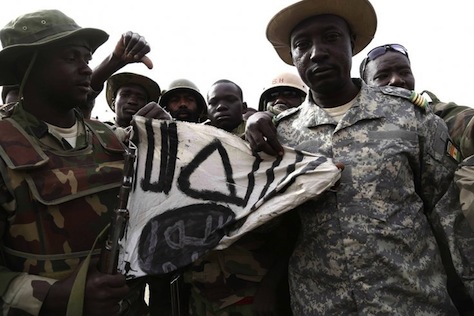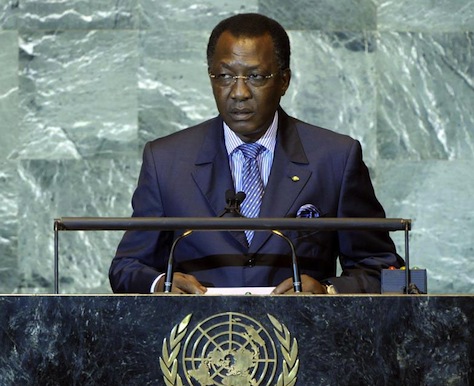 Photo credit to Emmanuel Braun / Reuters.
Photo credit to Emmanuel Braun / Reuters.
Nigeria, after a six-week delay, will elect its president today in its fifth regular set of elections since the return of quasi-civilian rule in 1999.![]()
![]()
The reason that Nigerians are voting on March 28 and not on February 14 was to give the Nigerian army the time to subdue Boko Haram, a northern Islamist insurgent group. Facing a tough fight for reelection and skepticism that he can prevent Africa’s most populous country from fragmenting, what does Nigerian president Goodluck Jonathan have to show for his six-week campaign extension?
Not so much.
* * * * *
RELATED: Six weeks can’t defeat Boko Haram —
or fix Nigerian democracy
RELATED: Nigeria emerges as Africa’s largest economy
* * * * *
Despite exhortions by the Nigerian government that Boko Haram is on the run, there’s evidence that even as military forces take back ground previously lost to insurgents, Boko Haram is changing its tactics — for instance, by increasing the frequency of suicide bombings:
NBC News analyzed JTIC data from the six weeks before and after the day Nigeria postponed the elections. Boko Haram carried out 10 suicide operations between Dec. 28 and Feb. 8, according to the data — which is drawn from a wide spectrum of open-source media reporting. The number of suicide bombings rose to 12 in the six weeks from Feb. 9 to March 23.
What’s more, hours before Nigerians cast their ballots for president, Idriss Déby, the president of neighboring Chad and one of sub-Saharan Africa’s more effective authoritarians, was giving rare interviews to the international media slamming Jonathan’s government. He claimed that the Chadian military was responsible for recent territorial gains, alleging that the Nigerian military is nowhere to be found, leaving Déby (pictured above) and Chadian forces suspended in a quasi-occupation of parts of northern Nigeria:
Mr. Déby’s anger at the Nigerians was barely restrained in the interview. “All we’re doing is standing in place,” Mr. Déby said. “And it is to the advantage of Boko Haram.”
“We’ve been on the terrain for two months, and we haven’t seen a single Nigerian soldier,” he added. “There is a definite deficit of coordination, and a lack of common action.” He said that time was running out for a larger victory against Boko Haram. “Soon it will be rainy season,” he said, explaining that it will be more difficult for troops to maneuver. “This will give Boko Haram a three-month bonus.”
Déby’s actions cut both ways. In one sense, it’s obviously emasculating to the Jonathan government, in particular, that it cannot control security through the entire territory of what is Africa’s largest economy. Like it or not, Déby’s success makes him an increasingly influential stakeholder in Nigerian government. On the other hand, the Chadian soldiers (along with the alleged use of South African and other mercenaries by Jonathan’s government to combat Boko Haram) have made just enough progress to give Jonathan a real shot at holding off his challenger, Muhammadu Buhari, a former military head of state between 1983 and 1985 and a four-time contender for the Nigerian presidency. Continue reading Six weeks and Chadian intervention didn’t stop Boko Haram in Nigeria

